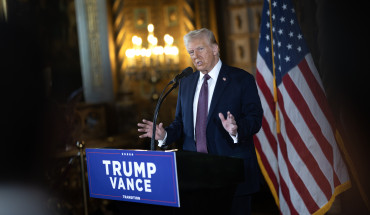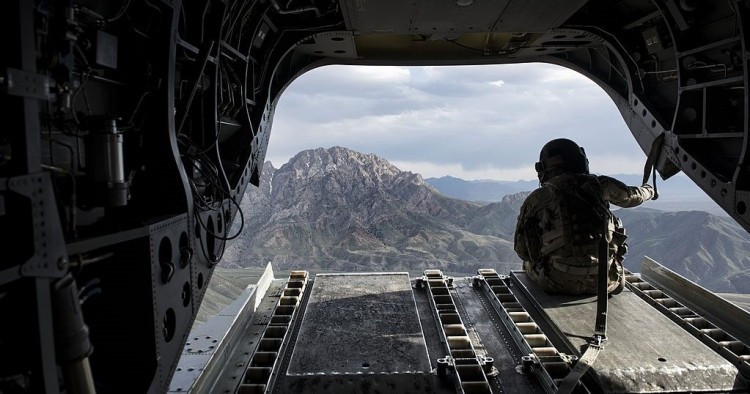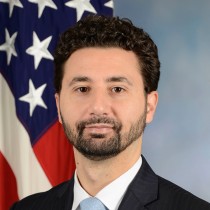

Introduction
In a speech on April 14, President Joe Biden announced the withdrawal of American forces from Afghanistan. "It is time to end the forever war," he declared. Set to begin on May 1, the process will be completed by September 11, 2021, the 20th anniversary of 9/11. What are the implications for Afghanistan, the U.S., and the wider region? We asked experts and scholars from across MEI to weigh in with their thoughts.
Viewpoints
-
Marvin G. Weinbaum
Marvin G. Weinbaum

Walking away from Afghanistan now is a mistake
The Biden administration decision to disengage militarily from Afghanistan by September 11 may seem warranted, perhaps even overdue, after a commitment of two decades and two trillion dollars. The U.S.’s initial objectives for intervention were seemingly achieved years ago and its subsequently acquired aims in staying have proved mostly unattainable. But while a full unconditional withdrawal from Afghanistan may appear to be defensible as the U.S. weighs its global threats, the president’s action is nevertheless shortsighted and narrow in its understanding of U.S. long-term security interests. Foremost, it is an “America First” policy that shows callous indifference to the consequences for a current-day Afghanistan that is to a large extent of our making. We are putting in motion developments that will eliminate any remaining possibilities for a negotiated peace, lead to increased violence, undermine a sitting government, collapse the formal economy, and place at risk the hard-won rights of Afghan women and minorities. The stage is also being set for an open-ended, proxy-driven civil war that in creating millions of refugees is likely to destabilize and radicalize the region.
In many ways we have been here before. After the Soviets bailed out of Afghanistan in 1989, the U.S. decided that it had little stake in what happened in the country and the region. Virtually all government assistance ceased. We decided to let the Afghans sort out their differences and left Pakistan, our erstwhile partner in the jihad against communism, to fend for itself in coping with the fallout of the decade-long Afghan conflict. What we got in Afghanistan was a bloody, anarchic, fratricidal civil war, the rise of the Taliban, the settling in of al-Qaeda, and 9/11. In Pakistan there followed a decade of political instability, an undeterred decision to go nuclear, and a high-altitude shooting war with an also nuclear-armed India that it took the U.S. to help stop. It would have to do much the same three years later to prevent a potentially more deadly, globally impacting conflict on the subcontinent.
If walking away from Afghanistan and the region was a mistake in the 1990s, it is ever so much more so now. The U.S. was not then worried about global terrorism or nuclear proliferation emanating from the region. Geo-strategically, we were unconcerned with having an adversarial Russia, China, and Iran among others filling the vacuum of an American absence. It is misguided to believe that we can compartmentalize our global interests. If tragedy befalls Afghanistan and the region falls into turmoil, it is difficult to believe that the U.S. can expect to realize its objectives in areas now deemed of higher priority. A continued American military presence in Afghanistan small enough to be politically palatable but large enough to contribute to the country’s stability might not seem very satisfying but given the alternatives it might have been the least bad of all possible outcomes. Unfortunately, the Biden administration decision now rules that out.
Marvin G. Weinbaum is the director for Afghanistan and Pakistan Studies at the Middle East Institute.
-
Michael K. Nagata and Joseph L. Votel
Michael K. Nagata and Joseph L. Votel


The implications for US counterterrorism efforts
Among the consequences of the U.S. military withdrawal from Afghanistan in 2021 will be the combination of two outcomes.
The first is the opportunity for al-Qaeda and ISIS to expand their reach and influence, and to begin preparations for trans-regional terrorist activities whenever they choose. Afghan forces are unable to hold back these groups without significant U.S. military assistance. This also extends to confronting the significant possibility of kidnap-for-ransom of private Americans or allied citizens that will undoubtedly remain in Afghanistan.
The second is the proven difficulty American counterterrorism efforts will confront if U.S. intelligence/military elements must attempt “over-the-horizon” operations into Afghanistan from distant bases. Intelligence gathering will be hampered by reduced human intelligence presence, and electronic collection will be degraded because of inability to install and maintain adequate in-country sensors. Long-range kinetic strikes or Special Operations raids can be sufficient for periodic efforts to either disrupt identified terrorist plots, effect leadership decapitation, or rescue hostages (assuming the necessary intelligence can be obtained). However, the episodic nature of this kinetic activity will be insufficient for strategically damaging the scale, scope, or growth of terrorist activity within, or that emerges from, Afghanistan.
Another strategic consequence is the psychological and political effect that reduced American counterterrorism efforts will have on the Afghan population. The Afghans are very aware that only U.S. counterterrorism efforts are capable of keeping al-Qaeda or ISIS from stronger footholds, and this directly contributes to the population's confidence in their security. The American withdrawal will end that confidence. Even a small residual footprint, such as the small Special Forces presence the U.S. maintained after the withdrawal from Iraq in 2011, gave the U.S. something to build upon if future necessity drives the U.S. to once again seriously contest terrorism from Afghanistan.
Lt. Gen. (ret.) Michael K. Nagata is a distinguished senior fellow on national security at the Middle East Institute. He retired from the U.S. Army in 2019 after 38 years of active duty, with 34 years in US Special Operations. His final position was director of strategy for the National Counterterrorism Center from 2016 to 2019.
Gen. (ret.) Joseph L. Votel is a distinguished senior fellow on national security at the Middle East Institute. He retired as a four-star general in the U.S. Army after a nearly 40-year career, during which he held a variety of commands in positions of leadership, including most recently as commander of CENTCOM from March 2016 to March 2019.
-
Anne Patterson
Anne Patterson

What’s next for Pakistan and the US?
The Pakistani government will see President Joe Biden’s announcement as a signal that a Taliban victory in Afghanistan is almost inevitable, and they will act accordingly. It will validate Pakistan’s strategy of keeping its options open for 20 years because of concerns that the Taliban would return to power. Pakistan’s immediate concern will be ever increasing ties among the Afghan Taliban and Pakistan’s own extremist groups and the Northern Alliance’s relations with India. The spillover from Afghanistan will endanger Pakistan’s fragile border provinces, promote refugee flows, and destroy any prospects for foreign investment. As a consequence, Pakistan will naturally look to China for the resources and trade arrangements to lessen the economic impact.
Pakistan will still seek to play a role in an Afghan peace process and might even consider an “over the horizon” counterterrorism operation. But the administration needs to define quickly what it means to “remain engaged.” Neither Pakistan nor Afghanistan has had a confirmed ambassador for years. Specifically, what will the administration do in the region to generate employment, investment, and trade, and not just fund more assistance projects? The administration needs to back the U.N. effort with serious diplomatic muscle and resources. Iran will have to be involved. But whatever the political or economic cost of such a strategy, it will be cheaper than the return of U.S. troops to Afghanistan or watching the current government meet the fate of Mohammed Najibullah.
Amb. (ret.) Anne Patterson is the former Assistant Secretary of State for Near Eastern Affairs and Ambassador to Egypt, Pakistan, Colombia, and El Salvador.
-
Bilal Y. Saab
Bilal Y. Saab

The military lesson of Afghanistan
The U.S. decision to withdraw all combat troops from Afghanistan by September 11 of this year was always going to be very difficult, no matter which president made it or when it was going to be made. But it didn’t have to be this difficult. We had 20 years to prepare for this very moment and give ourselves a chance to exit with fewer regrets and leave this place a little better than we found it. But we failed.
We failed at our most important task: not to pacify the country, achieve peace, or re-engineer Afghan politics — those were never in the cards — but rather to help build an Afghan army that could provide a modicum of security for the population and prevent transnational terrorists from once again setting up shop and plotting attacks worldwide. This remains our top priority in Afghanistan.
Perhaps that military project wasn’t realistic either, and it can’t be dissociated from the broader political and societal problems of the Afghans. Confidential documents obtained by The Washington Post in 2019 reveal that despite spending more than $83 billion in U.S. security assistance to Afghanistan since 2002, the Afghan military is “incompetent, unmotivated, poorly trained, corrupt, and riddled with deserters and infiltrators.” Unsurprisingly, things haven’t improved one bit since that report came out.
Yet for all the pathologies the Afghans have displayed, we’ve made some terrible choices, too. And the tragedy is that they’re not unique to Afghanistan. Look at Iraq, Egypt, Jordan, Lebanon, Saudi Arabia, etc. We’ve helped their armies become better terrorist killers through tactical/operational training and equipment. But we’ve never really helped them sustain U.S. aid and those enhanced military capabilities through proper investments in defense governance.
That’s why when we pull the plug on U.S. support, or just leave like we’re about to do in Afghanistan, the entire military assistance operation falls apart because it was never sustainable. This is the military lesson of Afghanistan. We had better heed it because we will experience it again in the region as we continue to shift to the Indo-Pacific.
Bilal Y. Saab is a senior fellow and director of the Defense and Security Program at the Middle East Institute.
-
Shanthie Mariet D’Souza
Shanthie Mariet D’Souza

New Delhi’s Afghan quandary
The Biden administration’s decision to withdraw U.S. forces from Afghanistan by September 11, 2021 will heighten anxieties in New Delhi predominantly in two areas: firstly, its impact on India's continuing presence in Afghanistan and ability to carry on with its aid-only policy; and secondly, its potential consequences for India’s national security, given the impact of regional proxy warfare and civil war in Afghanistan and the ungoverned space that will be once again available for anti-India and international terrorist groups to operate in that country. The coming four months will unveil how Afghanistan may change. The period may also see New Delhi preparing for the eventualities.
In spite of its inevitability, New Delhi has refrained from fine-tuning its policies to the reality of the return of the Taliban to the power center of Kabul. This is principally because it still views the Taliban as a strategic asset of the Pakistan intelligence establishment, mindful of the memories of the hijacking of Indian Airlines Flight 814 in 1999 and the Taliban’s continued links with anti-India groups like Lashkar-e-Taiba and Jaish-e-Mohammed. Further, it does not want to weaken the negotiating power of the Afghan government, in which it has invested for the last two decades. Not surprisingly, New Delhi has adopted a policy of lending its support to an “Afghan-led, Afghan-owned, and Afghan-controlled peace process” in sharp contrast to support for any externally mediated peace agreements.
In spite of the repeated calls from former diplomats and analysts to open a line of communication with the Taliban, the very idea behind New Delhi’s “wait and watch” policy is not to resist the return of the insurgents, but to ensure that the eventual domination of the Taliban over the Afghan polity isn’t complete. New Delhi has refrained from any unilateral outreach or negotiation with the Taliban so as to not undermine the democratic government led by President Ashraf Ghani. The decision to pull out U.S. forces could be a serious setback to such a policy objective.
Of late, the Biden administration has pushed for India’s expanded role in the peace process and New Delhi now has a seat in the proposed talks in Istanbul. However, that is unlikely to help address India’s apprehension that any change in its Afghan policy could bestow some level of legitimacy on the insurgents and weaken the beleaguered Ghani government. New Delhi has reasons to believe that the process is still in an ultra-fast-track mode and the announcement of withdrawal will further strengthen the negotiating power of the Taliban. Without a comprehensive and permanent cease-fire agreement accompanying the peace process, the Taliban has a clear upper hand.
This persisting policy dilemma and an accompanying sense of being a mere spectator to the sweeping changes potentially occurring in Afghanistan are likely to produce some level of anxiety in New Delhi’s diplomatic establishment. However, it is unlikely to lead to any major changes in its “wait and watch” policy. New Delhi may still place its bet on yet another extension to the withdrawal of international forces, beyond September 2021, amid spiraling violence in Afghanistan and the absence of conditions that favor a peace settlement.
Shanthie Mariet D’Souza is the founder and president of Mantraya, an independent research forum, and a non-resident scholar at the Middle East Institute.
-
Gerald Feierstein
Gerald Feierstein

In the Middle East, Biden’s decision comes as no surprise, but will it reinforce doubts about US reliability?
There’s been little immediate regional reaction to President Joe Biden’s April 14 announcement of a final decision to withdraw U.S. forces from Afghanistan. Certainly, the U.S. determination to quit its military engagement there has been evident for years and was reinforced by the agreement with the Taliban struck in 2020. Nevertheless, a departure that leaves critical issues related to Afghanistan’s future unresolved, and once again leaves an American partner unsupported, will only reinforce doubts about larger questions of U.S. commitment and staying power in the Middle East.
Much will depend, of course, on the future course of Afghan domestic affairs that are currently unforeseeable. Parallels can be drawn between the Biden administration’s commitment to preserve diplomatic and development support for the Afghan government as it ends its military engagement and similar commitments from Moscow to support the People’s Democratic Party of Afghanistan government following the Soviet military withdrawal in 1989. Soviet support sustained Mohammed Najibullah in power until the aid stopped in 1992. Will U.S. support similarly end after a “decent interval?” The end of Soviet support opened the door to a decade of internecine conflict in Afghanistan that ended with Osama bin Laden and 9/11. Has the Afghan government and society developed to a sufficient degree to withstand an end to U.S. engagement?
Similarly, regional views will reflect the potential that rivals Iran and Turkey will be able to establish footholds in Afghanistan following U.S. withdrawal. For the Arab Gulf states, the prospect that Iran could establish a dominant presence in Kabul — a “fifth regional capital falling under Tehran’s influence” — would be particularly troubling. The Saudi perspective will be important on that score. But perhaps more important will be the Emirati view. Like the U.S. military and our NATO allies, Emirati troops fought and sacrificed in Afghanistan for many years. The UAE leadership will need to measure its investment in blood and treasure against the outcome that it achieved.
Amb. (ret.) Gerald Feierstein is senior vice president at the Middle East Institute. He previously served as the U.S. ambassador to Yemen and principal deputy assistant secretary of state for Near Eastern affairs.
-
Syed Mohammad Ali
Syed Mohammad Ali

For Pakistan, new challenges but also new opportunities
The Biden administration’s decision to delay military withdrawal from Afghanistan may have been inevitable, but it has brought with it a new set of challenges for all concerned stakeholders, including Pakistan. While it is unlikely that Pakistan was consulted by the U.S. before setting the new September date for the withdrawal of American troops, Pakistan will remain under immense pressure to continue exerting influence on the Taliban to enable a “responsible” American exit within the next six months.
With limited leverage over the Taliban, Pakistan is now faced with the immediate challenge of helping to bring the disgruntled Taliban leadership back to the negotiation table, and trying to convince them to not target American and NATO forces, which could risk upending the peace deal entirely.
Meanwhile, Pakistan’s own economy is in a precarious position and the country remains on the Financial Action Task Force’s grey list for terror financing till June 2021. American support could help Pakistan boost its international credibility, yet the new U.S. administration has not shown a willingness to broaden its approach toward Pakistan beyond the achievement of specific geostrategic goals. While America’s troubles in Afghanistan may not have led to Pakistan being sidelined from the upcoming leaders’ summit on climate change, this omission sent a clear signal to Pakistani policy makers that their perceived utility remains confined to countering terrorism.
Pakistan’s growing relationship with China, and the American pivot toward India to counter China, also continue to complicate the bilateral relationship between the U.S. and Pakistan. Pakistan remains particularly wary of India gaining greater influence in Afghanistan.
While the Biden administration has bought itself more time to renegotiate the terms of its exit from Afghanistan, this delay provides some opportunities for Pakistan as well to try to reimagine its role in the region. American negotiators could work with Pakistan on the sidelines of subsequent peace negotiations on reinvigorating the stalled attempts to create a reconstruction opportunity zone straddling the Afghan-Pakistan border for manufacturing goods allowed preferential access to U.S. markets. The U.S. can also help put in place a needed water-sharing agreement between Pakistan and Afghanistan, the absence of which will put an increasing strain on these already water-stressed countries. These two efforts could go a long way in not only ensuring greater Pakistani support for the Biden administration’s exit plan, but also helping to boost much-needed economic sustainability and environmental resilience within the region.
Syed Mohammad Ali is a professorial lecturer of anthropology at George Washington University and a non-resident scholar at the Middle East Institute.
-
Fatemeh Aman
Fatemeh Aman

Apprehension in Tehran about what might come next
In his remarks on the move to withdraw American forces from Afghanistan by September 11, President Joe Biden stated that the U.S. will ask “other countries in the region to do more to support Afghanistan,” emphasizing that the challenge may not be resolved without the involvement of regional players.
Although U.S. Secretary of State Antony Blinken warned in his March three-page letter to Afghan President Ashraf Ghani that U.S. troops might leave the country by May 1, it was predictable that the withdraw could be delayed.
Secretary Blinken’s letter was firm, however, asking Ghani to “understand the urgency of my tone,” which indicated U.S. patience may have reached its limit. He also proposed in an eight-page peace plan to both the Taliban and Afghan government “to jumpstart Afghanistan Peace Negotiations” and called on both sides to review and revise it before a meeting of all parties that was planned to start this week in Turkey.
In the proposal, he called for a conference facilitated by the U.N. and involving the foreign ministers of the United States, Russia, China, Pakistan, Iran, and India, “to discuss a unified approach to supporting peace in Afghanistan.”
Afghanistan could perhaps be Biden’s biggest foreign policy challenge yet. He is facing opposition to both leaving and staying in the country. The fear among his allies in the Congress, Afghans, and some of Afghanistan’s neighbors is that a rushed American departure with a full withdraw by May could have pushed Afghanistan into more violence and anarchy.
Since 2018, Iran has openly hosted several delegations of the Taliban to discuss the “current political and security situation of Afghanistan and the region.” As Ali Shamkhani, the secretary of Iran’s Supreme National Security Council, stated on December 26, 2018, the meetings with the Taliban were aimed at preparing for the “serious” threat of the Islamic State-Khorasan Province (ISKP) presence in Afghanistan. Such a threat could prove extremely challenging in the context of a vacuum resulting from the sudden withdrawal of U.S. forces.
There is a genuine concern in Iran about a return of the Taliban to power if it happens through violence and war, rather than negotiations. There is also concern over the growing number of extremist groups, given that Afghanistan shares a 587-mile border with Iran. Tehran, even if silently, fears that a complete withdrawal of U.S. forces from Afghanistan, if rushed, could facilitate the emergence of armed terrorist groups. This would be similar to the outcome of the U.S. troop withdrawal from Iraq in 2011 that led to the emergence of ISIS, as Iraqi security forces were unprepared and unable to take responsibility for the country’s security.
Given the news of the delay and more gradual withdrawal of U.S. troops, Tehran can breathe a little easier — at least for now.
Fatemeh Aman is a non-resident senior fellow at the Middle East Institute.











